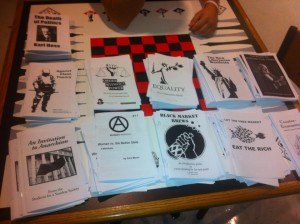I’d like to first thank Mr. Lock for his thoughtful, well-mannered observations on my little piece. Commenters such as Mr. Lock honor me with their courteous thoughts and, in my humble view, raise the bar for discussion and debate by refraining from ad hominem and from attempts to impute motives; dealing with my points and arguments themselves, Mr. Lock offers both of us and every other observer the chance to be edified by the exchange. Kudos to him. I hope that he will forgive the use of quotes here to help explicate my individualist anarchism, and that he will further pardon me for not addressing his points seriatim. Also, please be mindful of the fact that the views hereunder belong to me and not necessarily to the Center for a Stateless Society or any other individual in its employ.
In treating the relationship between inequality and injustice, it is important to note that we individualist anarchists ultimately have no problem with the mere fact of income inequality per se. That is, some people should make more money than others, based on factors including the amount of time these people dedicate to toil, their level of skill, and the disagreeableness of the work in question. As Laurance Labadie put it, “In a world where inequality of ability is inevitable, anarchists do not sanction any attempt to produce equality by artificial or authoritarian means. The only equality they posit and will strive their utmost to defend is the equality of opportunity. This necessitates the maximum amount of freedom for each individual. This will not necessarily result in equality of incomes or wealth but will result in returns proportionate to service rendered.” Or else as Henry Appleton put it in the pages of Liberty, anarchism’s “central idea is the direct antipodes of levelling.” What we do propose, however, is to destroy all sources of income that are not based on work of any kind (be it intellectual work or physical—never mind that the line between even these is practically exceedingly difficult to draw)[1], to prevent capitalists form using aggression in the form of privilege to draw what is akin to a tax from labor.
The individualist anarchists often compared rent, interest, and profit to taxation. Whether we agree with them ends up turning to a large extent upon speculation as to the results and relations that a genuine free market would yield. Since we agree that we don’t have such a free market in the present moment, we may disagree as to whether today’s idle rich could continue their lucrative moneymaking schemes absent the State and the many monopolistic privileges it grants them. Thus when we argue with John Beverley Robinson that equality is “a cold mathematical fact” which naturally and ineluctably results from “the hypothesis of free production and exchange,” we are indeed contending at the very least that the widest inequalities of today are the proximate products of privilege—even if not all inequalities are such. The location of the line, again, is impossible to pinpoint. Individualist anarchists, of course, would allow the market to locate it, and have always followed Benjamin Tucker in making liberty the top priority. The point is that we see existing disparities of wealth as hints that something is profoundly wrong—that disparities of political power are in fact at play, with politics not economics claiming responsibility for the capitalistic economic forms of the present.
But then what do individualist anarchists mean by our opposition to capitalism? First, I freely admit that insofar as I defined the word “capitalism” in the way that you do, I would adopt it as a statement of my own economic views. Capitalism as “the condition in which no-one is prevented from justly acquiring or justly using wealth” is a system hardly to be objected to by any thoroughgoing libertarian anarchist. But free market champions like Tucker and Heywood did not define capitalism in such a favorable way, and my C4SS colleagues have set forth several very good reasons why definitions that equate free markets and capitalism probably ought to be avoided.
I would rather join the individualist anarchists in defining “capitalism as a system of privilege, exploitation, accumulation without limit, theft, abuse, and wage slavery, all supported by the coercive authority of the state.”[2] We must remember also that Franz Oppenheimer shared many fundamental economic views with the individualist anarchists and railed against “the idea of using a human being as a labor motor.” Oppenheimer regarded many of capitalism’s most basic elements—for instance, the taking of rent on real property—as products not of the “economic means,” but of the “political means.” This is, I think, the real crux of the disagreement here at issue: To what extents do the relationships and inequalities of capitalism rely on the coercive interventions of the State? Can landlords obtain their rents without land monopoly? Can bankers obtain their interest streams without arbitrary privileges that preclude competition? Can the great manufacturers and retailers obtain their profits without using legal and regulatory means to prevent competitors from cutting in on their margins? Similarly, could they pay so little in wages if the State did not rule out so many natural opportunities? I believe that the answer to all the foregoing questions is approximately “no,” and thus that many if not most of today’s lauded capitalists are Mr. Lock’s Takers, Robbers, Shirkers, and Raiders. This is not to suggest that they are engaged in some conscious conspiracy, only that they are the principal beneficiaries of a system that institutes legal monopoly and therefore allows privilege-holders to accumulate ever more wealth without working.
I’ll stop here, since I’ve run on far too long, but I hope that my comments here shed light on my piece and on the individualist anarchist opposition to capitalism. Thank you again to Mr. Lock for reading and commenting.
[1] As Benjamin Tucker wrote, “If the men who oppose wages—that is, the purchase and sale of labor—were capable of analyzing their thought and feelings, they would see that what really excites their anger is not the fact that labor is bought and sold, but the fact that one class of men are dependent for their living upon the sale of their labor, while another class of men are relieved of the necessity of labor by being legally privileged to sell something that is not labor, and that, but for the privilege, would be enjoyed by all gratuitously.”
[2] Feel free to visit my site www.individualistanarchist.com for more on this.











